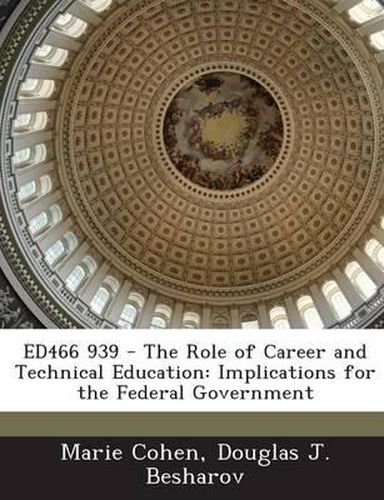Readings Newsletter
Become a Readings Member to make your shopping experience even easier.
Sign in or sign up for free!
You’re not far away from qualifying for FREE standard shipping within Australia
You’ve qualified for FREE standard shipping within Australia
The cart is loading…






The role of career and technical education (CTE) was explored through a review of the research on CTE. Research on the following topics was examined: the high school dropout problem; high school graduates’ transition to work; unprepared college students; the importance of noncollege careers; things employers really want; CTE’s promise; the history of CTE; current CTE programs; public attitudes toward CTE; and CTE in other countries. Research findings regarding the effectiveness of CTE were discussed along with the limitations of research based on national student surveys and studies of self- contained CTE programs. It was concluded that the “college for all” myth is shortchanging those young people who are either uninterested in or unsuited for college and that CTE has the potential to create a better future for these young people. Perpetuating the college-for-all myth, schools are de- emphasizing employers’ needs, reducing vocational education, and retiring teachers who have employer contacts. The federal government can reverse these trends, but it must first acquire a stronger influence over CTE programs at the local level. It can accomplish this by sponsoring high-quality research, disseminating the results, developing curriculum and other materials to be used by schools nationwide, and providing technical assistance. (Contains 111 references and 230 footnotes.).
$9.00 standard shipping within Australia
FREE standard shipping within Australia for orders over $100.00
Express & International shipping calculated at checkout
The role of career and technical education (CTE) was explored through a review of the research on CTE. Research on the following topics was examined: the high school dropout problem; high school graduates’ transition to work; unprepared college students; the importance of noncollege careers; things employers really want; CTE’s promise; the history of CTE; current CTE programs; public attitudes toward CTE; and CTE in other countries. Research findings regarding the effectiveness of CTE were discussed along with the limitations of research based on national student surveys and studies of self- contained CTE programs. It was concluded that the “college for all” myth is shortchanging those young people who are either uninterested in or unsuited for college and that CTE has the potential to create a better future for these young people. Perpetuating the college-for-all myth, schools are de- emphasizing employers’ needs, reducing vocational education, and retiring teachers who have employer contacts. The federal government can reverse these trends, but it must first acquire a stronger influence over CTE programs at the local level. It can accomplish this by sponsoring high-quality research, disseminating the results, developing curriculum and other materials to be used by schools nationwide, and providing technical assistance. (Contains 111 references and 230 footnotes.).